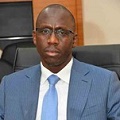Friday, Apr 15, 2022 | 09:00 AM - 10:15 AM
Location: Media Studio - Blue Level, HQ1-B-640
Digital transformation and business continuity through COVID-19. A conversation with the Senegalese tax administration about how they are building resilience through improved digitalization, with FAD's assistance.
 |
Rene Ossa Fiscal Affairs Department, IMF |
Rene Ossa is a Senior Economist at the IMF’s fiscal affairs department. He has over 15 years of experience in identifying tax administration’s emerging issues and helping authorities in francophone Africa, design and implement comprehensive revenue administration reform strategies. On digitalization, he organized the first Hackathon on public finances “digitalizing the Senegalese tax administration,” supervised in Benin the first experience of the introduction of the electronic VAT invoicing machines system in SSA francophone countries and led experimental post-hackathon missions to assist with implementing hackathon winning solutions. Mr. Ossa authored numerous publications including three books (“Administering the tax system”, “Tax reforms and development in sub-Saharan Africa”, and “Individual taxation and international mobility of persons”), three papers (“The structural organization of tax administrations in Africa: A reform to achieve’, “The geopolitics of the territoriality of the corporate income tax,” and “The taxation of Gambling in Africa’ (co-authored). Mr. Ossa holds a PHD on Public and tax Law at the University of Paris 1 Pantheon-Sorbonne, France.
 |
Bassirou Samba Niasse Director General of the Senegalese Tax Administration (DGID) |
Bassirou Samba Niasse is the Director General of the Senegalese Tax Administration (DGID) since July 2019. Senior Inspector of Taxes and Domains for nearly 25 years, Mr. Niasse has held several positions within the ministry of finance with outstanding achievements. Secretary General of the Ministry of Finance from 2017-2019, he initiated and coordinated key revenue administration and tax policy reforms including the implementation of hackathon’s solutions, the development of the Medium-Term Revenue Strategy (MTRS) an the Yaatal program which aims to enlarge the tax base though a comprehensive and balanced approach that combines taxpayer services and coercive actions. Mr. Niasse is an economist and has completed several certifying training courses in major high schools such as Harvard University and HEC Paris.
 |
Serge Mani Fiscal Affairs Department, IMF |
Serge Mani is a Technical Assistance Officer at the IMF’s Fiscal Affairs Department, working as a long-term expert for Cameroon, Senegal, and Rwanda. He has extensive experience in implementing tax information systems, especially in terms of conceptual, application, technological and security architectures. Over the past 18 years, he acquired several international certifications, including CISA (Certified Information Systems Auditor), CISM (Certified Information Security Manager), and CDPSE (Certified Data Privacy Solutions Engineer), from ISACA (Information Systems Audit and Control Association) for the monitoring, auditing and implementation of IT systems, security, and privacy. Mr. Mani has co-authored more than 10 scientific publications on Internet Privacy Preservation and is the pioneer of the concepts of “Blind electronic commerce” and “Secure anonymous physical delivery.” He holds a PhD in Computer Science from University of Montreal, Canada.
Costa Rica is adopting new technologies to improve treasury management and service delivery to the citizens. Based on a prototype designed in a hackathon supported by the IMF, a digital solution was adopted to enhance the efficiency and transparency of cash transfer social programs payments, promoting at the same time the financial inclusion.
 |
Mauricio Arroyo Rivera Deputy Treasurer of Costa Rica |
Mr. Mauricio Arroyo Rivera is currently the Deputy Treasurer of Costa Rica. In this position, he has promoted a strategic collaboration between different areas of the Government and the improvement of Costa Rica’s information systems related to treasury management, including the treasury single account, and budget execution. He has represented the Ministry of Finance before different entities, giving advice on topics such as debt management, securities, among others. He has broad experience in the private and public sector where he has been serving since 2004. Prior to joining the National Treasury, he worked for the banking entities, the academy, and as an independent consultant. He holds a Master’s degree in Business Administration from Instituto Tecnológico de Costa Rica and a degree in Economics from Universidad de Costa Rica.
 |
Gerardo Una Fiscal Affairs Department, IMF |
Gerardo Una is a Senior Economist at the Fiscal Affairs Department of the IMF. He provides technical assistance to governments in Latin America and the Caribbean, Africa, and South Asian countries on treasury management, public investment management, financial management information systems (FMIS), and digital solutions to improve fiscal management. Currently he is leading digital innovations and public financial management initiatives at the Fiscal Affairs Department. He has recently published two IMF Special Series on COVID-19 notes on digital solutions for direct cash transfers and enhancing digital solutions to implement emergency responses. Also, he is the secretariat of a Working Group responsible of designing 2022-2027 FAD Capacity Development Strategy. Prior to join the IMF, he worked at the Ministry of Finance of Chile, the Ministry of Finance of Argentina, and the Ministry of Finance of Paraguay. He holds a bachelor’s degree in Economics from the University of Buenos Aires, Argentina.
Since the beginning of the pandemic, many countries have opted for mobile government-to-person (G2P) payments leveraging the global adoption of mobile phones to better reach their unbanked populations in need. But implementing a G2P payment system rapidly and safely is easier said than done. Thanks to this working prototype developed during the IMF COVID-19 Call for Ideas Challenge and leveraging an IMF Working Paper, this initiative can be of relevance for the post-pandemic recovery of IMF member countries.
 |
Soheib Nunhuck Information Technology Department, IMF |
Soheib Nunhuck is a Digital Expert specialized in GovTech at the IMF Digital Advisory Unit. He is an experienced technologist focused on the whole-of-government digitalization of countries. Soheib has re-designed and actively monitors an analytical framework which leverages national digital strategies and quantitative indices to draw country profiles assessing their digital maturity and readiness. Together with the Fiscal Affairs Department, Soheib is raising awareness on GovTech to our member countries and their Ministries of Finance. He also liaises with other likeminded international organizations and key GovTech stakeholders with mutual interests. Soheib possesses a MPA in Development, Technology and Innovation Policy from University College London, a BSc (Hons) in Management and Information Technology from Lancaster University, and is currently completing an Executive Certificate in Public Policy at Harvard Kennedy School.
 |
Katherine Baer Fiscal Affairs Department, IMF |
Katherine Baer is a Deputy Director in the IMF’s Fiscal Affairs Department (FAD). Her portfolio includes oversight over FAD’s tax work, supervision of Capacity Development (CD) delivery to countries in the Middle East, North Africa and Centra Asia, and overseeing FAD’s strategy for CD delivery to Fragile and Conflict-Affected States. She also manages the department’s work on defining and implementing fiscal policy from a gender perspective. Her 23-year career at the IMF has focused on strengthening fiscal policies and institutions in IMF member countries across all regions. During 1995-2008 she focused on advising the Central Asian and European countries in their transition to a market economy and in preparing to join the European Union. In addition to her Fund career, she has been an economist in the U.S. Treasury and an assistant commissioner in the Mexican Tax Administration. Ms. Baer has many publications in the public finance field and holds a Ph.D. from Cornell University.